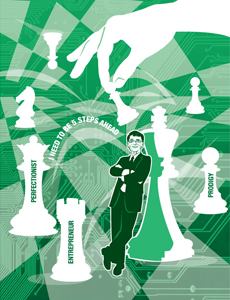“Windows … already contains features such as the human discipline component, where the PC can send an electric shock through the keyboard if the human does something that does not please Windows.”
DID YOU KNOW…
- Bill Gates designed the scheduling system at his own high school and ensured that he would be in classes with a majority of girls.
- In sixth grade, Gates’ mother sent him to a psychologist for being uncooperative. After working with Gates for a year, the doctor advised his mother, “You might as well just get used to it because you’re not going to beat him.”
When most people think of Bill Gates, the word “wealth” usually comes to mind first. After all, Gates has held the title of world’s richest man for the better part of 15 years.
But that financial success was created by an enterprising mind, cunning business acumen and an obsession with programming software.
“Not only was Gates a technological genius, but he was an excellent businessman with extreme focus and fanatic passion,” says Vance Gillette, longtime industry veteran and consultant in customer relations for Zodiac Pool Care in Vista, Calif. “I can’t imagine a better example of the American spirit.”
Gates showed his entrepreneurial leanings while still in high school. By age 14 he had formed a computer programming collective with friends, and they landed a freelance job debugging operating systems for a local computer company.
The experience was enough to attract another nearby employer, who paid the boys to write a payroll program.
But Gates truly tested his entrepreneurial sea legs after dropping out of Harvard in 1975 to form Microsoft with Paul Allen, one of the programmers from the high school group.
“Can you imagine leaving the country’s most prestigious university?” Gillette says. “That took some guts.”
Of course, Microsoft went on to worldwide dominance, but it didn’t just come through revolutionizing computer software. What is remarkable about Gates is how clever he was — particularly at a young age — in doing business with his contemporaries.
In 1980, Gates negotiated with established industry giant IBM. He sold them an early version of DOS at an affordable rate, but cleverly kept the copyright so he could farm the system out to other computer companies. The sales of MS-DOS made Microsoft a major player in the industry.
“I love the fact he realized it was in the operating system and they thought they were negotiating with this nerd,” Gillette says. “He was a master chess player — already five moves ahead. While people were trying to know what their next move was, he had already figured it out.”
Once Microsoft had established itself, Gates was all but unstoppable. Making short work of competing operating systems, he established Windows as the de facto PC control board.
Some accused Gates of even designing Windows to interface better with Microsoft applications, putting competitors at a further disadvantage. Of course, his master tactics came to a head in 1998, when the government filed an antitrust suit against the company.
“He has a true love of programming,” Gillette says. “Even after Microsoft was doing really well, Bill Gates used to personally go over every line of code. Can you imagine that? You hire someone for that and then take all the credit.”


